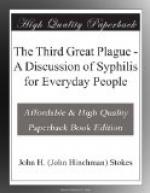+Dispensary Service.+—The provision of adequate treatment and diagnostic facilities, on a par with those which will presently cover Europe, will mean the following things: First of all, dispensaries, and many of them, for the identification of early cases, fully equipped with dark-field microscopes, with record systems, and with the means for following patients from the time they enter until they are cured. This means nurses, it means social service workers, it means doctors with special and not general knowledge of syphilis and gonorrhea. The Brooklyn Hospital Dispensary is an admirable example of what such an institution should be, but it is one where such institutions should be numbered by dozens and by hundreds. Copenhagen, with a population less than that of several cities in this country which have none, has seven municipal clinics whose hours and names are prominently advertised.
+Hospitals.+—In the second place there must be hospital facilities. They must not be venereal hospitals, but services or parts of general hospitals, so that patients who are received into them will be protected from stigma and comment. Pontopidan, a Danish expert, estimated that for the care of venereal disease one hospital bed to every 2000 of population was insufficient, and yet there are cities in this country which do not have one bed available for the purpose to 100,000 people. The hospital performs a peculiarly valuable function in the care of syphilis in particular. It provides for temporary quarantine, and for the education of the patient in his responsibility to the community when he is discharged. Three weeks or more under hospital direction is the best possible start for an active syphilis that is to be cured. The privacy of a syphilitic can be protected in a hospital as successfully as in a specialist’s office, and the quality of treatment which can be given him is distinctly better than he can obtain while out and around. Hospitals in general have kept their doors closed to syphilis until recently, and it is only under the pressure of a growing understanding of what this means to the public health that they are awakening to their duty.




